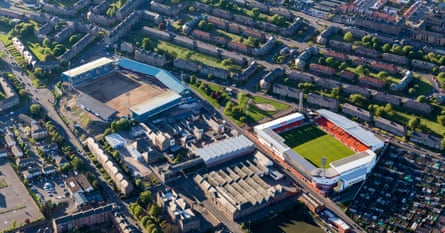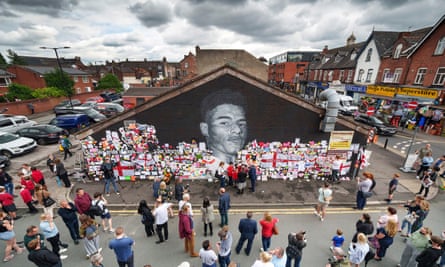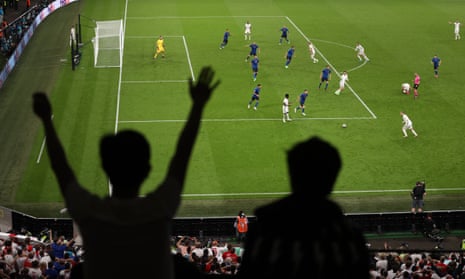For me, 11 July 2021 will go down in history. Not as the date of the England men’s football team’s first major final since 1966, but the first time as an adult I supported England in a major tournament. Since 1980, I have found myself looking forward to the point in tournaments when England are knocked out and I can enjoy the rest of the competition, so it was a very different experience to find myself seriously pondering the choice between Braveheart Mancini or Humble Southgate before the final.
But why did I end up supporting Anyone But England in all those other tournaments? Was it schadenfreude, the trepidation of UK media, which is dominated by the thoughts and concerns of England, reacting to an England victory? Or maybe it was just the commonplace behaviour of any football fan, helping to cement my own sense of community and belonging by the use of the “other”.
Being a football fan provides a context for belonging, just like a shared love of music or a passion for going to the theatre. Fans form what has become known as an “imagined community”, a term introduced in a 1983 book of the same name by Benedict Anderson. The idea of imagined communities is that above a certain size it is impossible for everyone in a social group to know everyone else in the group personally. The size is actually quite small – no more than a few hundred people – and beyond that, we can only imagine what the rest of the community think.
Anderson developed the idea to discuss nationalism but it can apply equally well to all sorts of social affinities, including the fans of a football club. To follow the nation-state analogy, the season ticket holders might be the residents of the capital, the more occasional matchday attendees live out in the suburbs, and the other fans are out further still. Distance in this case is one of connection rather than physical separation, ranging from watching the team in every game, home and away, to having a passing interest in the team’s fortunes and noticing when they are involved in a big match.
I remember being in a pub on a Saturday and sneaking a look at the TV screen above the bar to see the latest scores, at which point one of the oldest women in my group, a white-haired septuagenarian, looked at the screen and asked animatedly: “Did the Jambos win?” I don’t believe she went to matches but she was still interested to know how her team had performed. She lived in a small village out in the country but was still a member of the Hearts “nation”.
As with any imagined community, fans share opinions about the world and a common history. We want the team to be successful and are proud of the players and our own connection with the team. Knowing key dates from the past, whether we were there or even alive at the time, are part of belonging to the community. And, like nations, the boundaries of the community are partly determined by the differences between our group and other, neighbouring groups.
Scotland’s three east-coast cities represent different facets of football-supporting imagined communities. In Aberdeen, a one-club city until very recently, the “other” has been external and largely defined by competition rather than geography. Edinburgh has two big teams largely but not exclusively representing two halves of the city. There are historical, sectarian aspects to the history of both Hearts and Hibs but generally the divide between the two supporters is much more about place and family than religious and political issues.
In Dundee, where I grew up, the two football grounds are at opposite ends of the same short street. Although United were originally Dundee Hibernian, a team for the large Irish community, they, like Dundee, have never been a sectarian club. Supporters of both teams come from all over the city, sometimes from the same household. More than one friend of mine supports United while a sibling follows the Dee. In my late teens, I would go to either ground according to who was at home that weekend. On one occasion two of us were heading to Perth to see United play when a train cancellation disrupted our plans. Rather than completely miss out on our Saturday afternoon game, we just headed up the hill to Dens Park to watch Dundee instead.
So, when people say supporting Anyone But England is “just the football thing to do, because you’d never expect a Hibs fan to want Hearts to win a game”, I find myself disagreeing. Or at least disagreeing with the second half of the statement. Picking sides is “the football thing to do” but making simple assumptions about who that side should be is not. Many Hibs and Hearts fans would actually rather see their local rivals win a cup final against one of the Old Firm. Find the right circumstances and we can support our fiercest rivals.

To me, picking a side is fundamental when watching football. All sport, almost by definition, is adversarial. The same activity, without the competitive objectives defined in the rules of the game, is simply exercise or leisure. We don’t even need to know that much about the game to be swept along by the narrative.
I remember flicking through the channels during the London Olympics in 2012 and stopping to watch what the commentator said was likely to be the last few points of the men’s volleyball final. Brazil were leading Russia 2-0 and 22-19 and had just brought on their soon-to-be-retiring captain, who hadn’t really featured in the tournament but they wanted him to be on court for the victory. Except Russia weren’t prepared to give up. They dived around the court and blocked everything before finally winning the third set 29-27. By then I was hooked and rooting for the team in red who turned the match around completely, winning in the deciding fifth set and becoming the first Olympic champions to come back from two sets down.
Over the course of a football season, every match has some significance on where our team will eventually finish. Picking a side in a game in such circumstances is therefore merely an extension of supporting our team. What I find more interesting is how we choose who to support when there is no direct effect on the fortunes of our team. I have my own lesser favourites alongside my main team: teams I have gathered over the years for one reason or another and whose fortunes I follow to varying degrees. Conversely, there are teams I am less likely to favour. I can pick a side in almost any match involving a Scottish team pretty quickly, even if the criteria used may change from season to season.
A certain football management computer game has led me at one time or another to follow Raith Rovers, Greenock Morton, Stirling Albion and Elgin City. Generally I like to see underdogs do well; Dundee doing well enough to be in the top league with United, Hibs in preference to Hearts, as that’s the half of the city I lived in when I first moved to Edinburgh, and just about anyone to beat the Old Firm. Previously I would have picked Celtic over Rangers but years of Celtic dominance of the Scottish game, not to mention several top players lost from Tannadice – two just before a League Cup final – has tilted the balance the other way, at least for now.
Like many Scottish football fans, I have an English team. Sharing much of our media with our neighbours south of the border, it is easy to follow the fortunes of English clubs. In my own case, although my English team came first, when it came to it Dundee United supplanted Leeds United. The only time they have played each other – a friendly at Elland Road in 2014 – I was there rooting for Dundee United, but against any other opposition I want Leeds to win. The Leeds perspective informs some of my preferences in the English leagues but so too does time spent at university in Durham and London, and family connections in Yorkshire. After Leeds I look out for Newcastle, Arsenal, Huddersfield Town and Sheffield Wednesday.
When it comes to it, I can usually pick one side from most of the classic football rivalries. Newcastle over Sunderland, Arsenal over Tottenham and Wednesday ahead of the Blades. The same applies in other cities and countries too – Everton over Liverpool, Birmingham instead of Villa, Barça not Real, Feyenoord above Ajax, AC over Inter and just about any German team instead of Bayern (Paris 1975 still hurts).
These are the instincts I bring with me when I start to watch a match. With less familiar teams, there is much less to go on. It might be as trivial as the strips the teams come out in, or even the early passages of play, but I always find myself wanting one side to win.
Which brings us to international football. Although Scotland did well in qualifying for major tournaments in the 1970s, 1980s and 1990s, until Euro 2020 we hadn’t reached that stage for more than 20 years. And back when we did qualify, we never moved beyond the group stages. So if Scotland weren’t playing, who to support?
Growing up in the era of Johan Cruyff, I still want the Dutch to do well. I also like to see the Scandinavian teams win. They are small nations, like Scotland, but punching above their weight and that is something to aspire to. But what of the bigger football powers? There seems to be an assumption that the world loves Brazil but they don’t always get my vote. It can come down to specific favourite players I want to see succeed. In the last four World Cup finals I have supported Croatia (small-nation underdogs), Argentina (Lionel Messi), Netherlands (see above) and France (Zinedine Zidane). All this demonstrates is that I can clearly pick losers, even when Scotland aren’t involved.

Which brings us to the tricky one: England. It is difficult to detach from the political dimension, with the separate teams for the four nations of the UK functioning as a major expression of continued national identity. The skewed nature of the UK population is reflected in a national media largely speaking to England and whose assumption that “we” are rooting for “them” has usually led me to choose England’s opponents in major tournaments. With so many other aspects of UK cultural life subsuming Scotland into a largely English UK identity, retaining the difference in the Scottish imagined community provided by the football team makes it difficult to just give it up, whether or not you believe that the nation belongs within the UK or as a separate nation state.
This time, however, my personal calculus seemed a little different. The England team and manager were different. As a player Gareth Southgate had a key role in several games when I was supporting England’s opponents. He missed in the semi-final penalty shootout as England fell at the penultimate hurdle in Euro 96; he was in the team at the World Cup in 1998 when they were knocked out by Argentina in the last-16; and he came on for the last 10 minutes of the final group game in Euro 2000 when, with England drawing 2-2 and heading to the quarter-finals, a late Romanian penalty knocked them out once again.
However, as England manager he made a break with the past. He challenged the football orthodoxies, brought in new players and new ways of doing things and played down the jingoism and the expectation. His pre-tournament message seemed well thought out and covered much more than football.
His players also went beyond the game itself, challenging the racist elements of their own support by continuing to take the knee before matches even in the face of boos from fans and criticism from politicians who called it “gesture politics”. The same politicians whose lack of action in tackling child poverty had been challenged so effectively by the players, especially Marcus Rashford, whose campaign for free school meals led to change in government spending. It felt that they were on the same side as I was. One of them even played for Leeds, with an inspiring personal story of how he came from a poor background and rose through the Elland Road youth set-up to play for his country and in the Premier League.
They weren’t “my” team but when it came to settling down to watch the final against Italy I found myself wanting an England win. Given my record, though, perhaps they would have preferred me to back Italy.

Comments (…)
Sign in or create your Guardian account to join the discussion